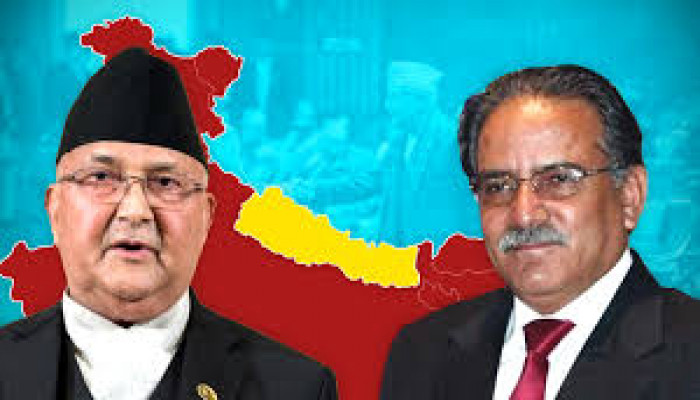Nepal's Prachanda-led government faces uncertainty amidst Deuba-Oli talk
- In Reports
- 09:06 PM, Jul 01, 2024
- Myind Staff
A high-level meeting between Nepal’s two largest parties, Nepali Congress and CPN-UML, has sparked speculation that the days of Prime Minister Pushpa Kamal Dahal ‘Prachanda’-led government may be numbered.
Nepali Congress president Sher Bahadur Deuba visited the residence of Communist Party of Nepal-Unified Marxist Leninist (CPN-UML) chairman and former prime minister K P Sharma Oli, who is part of the ruling coalition, on 29th June. The meeting, held behind closed doors, focused on the current political situation in the politically fragile country.
While the details of the meeting have not been disclosed publicly, there is speculation within some political circles that the two leaders discussed the possibility of forming a new coalition government to replace Prachanda's administration.
Oli, who has his eyes on the premiership once again, expressed dissatisfaction with the recent budget allocations for fiscal year 2024-25, which he publicly criticised. However, sources close to Prime Minister Prachanda have dismissed speculations of a shift in power dynamics. They emphasised that both Prachanda, chairman of the CPN-Maoist Centre, and Oli, chairman of the CPN-UML, are committed to maintaining the current coalition government for its full term.
According to Prime Minister’s Press advisor Govinda Acharya, Prachanda and Oli held meetings on June 30th and July 1st at the Prime Minister’s Office in Baluwatar. During these meetings, they discussed the current political situation and strategies to strengthen the existing coalition government.
Acharya stated, "The two leaders discussed ways to enhance government performance and ensure the cohesive functioning of the ongoing coalition government." He further clarified, "There is no truth to rumors about changes in the current coalition government or the formation of a new alliance."
The two leaders, Prachanda and Oli, have agreed to include other political parties like the Nagarik Unmukti Party, which supported the government during the vote of confidence, according to Govinda Acharya, the Prime Minister’s Press advisor. Despite Prime Minister Prachanda's government having successfully passed three votes of confidence in Parliament during his one-and-a-half-year term, Nepal continues to face political instability, noted Gunaraj Luitel, chief editor of Nagarik Daily.
Luitel argued that political stability could be achieved only if the Nepali Congress, the largest party in Parliament, and the CPN-UML, the second largest party, come together and share power. He expressed concern over the current scenario where the third largest party, the Maoist Centre, is leading the government while the Nepali Congress remains in opposition. "It seems unnatural when the Maoist Centre, the third largest party, is leading the government and the largest party, Nepali Congress, is sitting in the opposition," Luitel remarked.
The Nepali Congress holds 89 seats in the 275-member House of Representatives, while the CPN-UML and CPN-Maoist Centre have secured 78 and 32 seats respectively. Senior journalist Gunaraj Luitel, closely observing leftist politics in Nepal, stated that serious discussions are underway between the Nepali Congress and CPN-UML to navigate the current political uncertainty in the country. "If the two pillars of democracy, Nepali Congress and CPN-UML, come together, it will stabilise politics and bring much-needed stability to the country," he commented.
According to some media reports, Sher Bahadur Deuba and K P Sharma Oli have discussed an arrangement to share the remaining three years of the parliamentary term between the two largest parties. They reportedly agreed to a proposal where Oli would serve as Prime Minister for the first one-and-a-half years, followed by Deuba taking over for the remaining term, thereby alternating the leadership position.
Worried about the closed-door meeting between Sher Bahadur Deuba and K P Sharma Oli, Prime Minister Prachanda reportedly visited Oli to reassure him that the government is committed to addressing the concerns raised by the CPN-UML, including their reservations about the new budget, according to observers. Nepal has experienced 13 different governments in the last 16 years, highlighting the ongoing political instability in the country.
Image Source: NewsLaundry







Comments